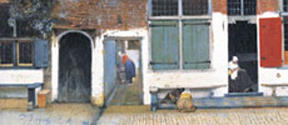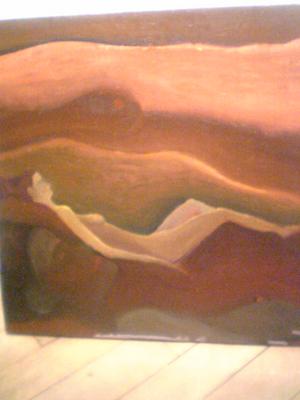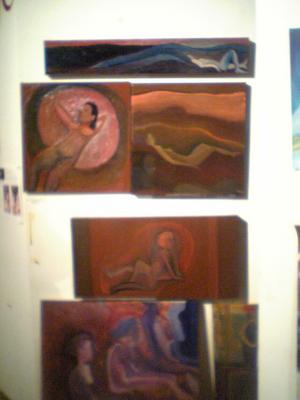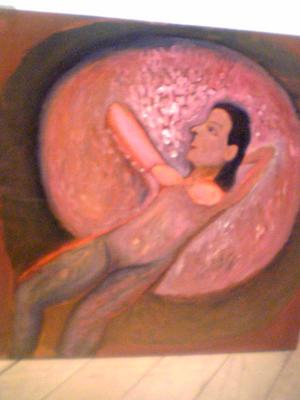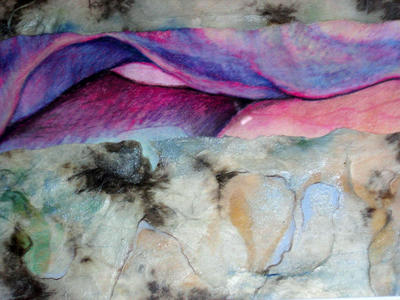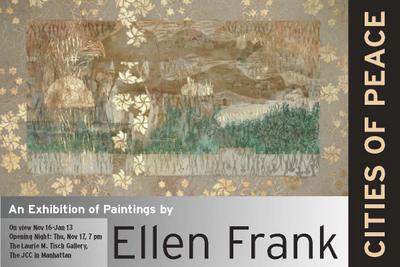
I playfully address to you a ghazal
pursuant to that request from you a ghazal
time's coils are darkling you of the swirling clockwork
O Kal! might I suggest to you a ghazal?
each day (like noon & midnight) could one proffer
the highest & the best to you in ghazal?
when minutes & hours unite in plangent
namasteradifs can gong (no jest to you) in ghazal
whoever should dive into the shaira's sheets
could dream in the cozy nest of you O ghazal
Ardeo! Plato's cave remains your jailhouse?
nice show! but where's the rest of you O ghazal?
if the play of rhyme suggests the clang of chains
I'm bound to try the test of you O ghazal!
once you had magicked into this miniature mirror
what priya's nazaar were caressing you O ghazal?
Ardeo! why do you pile up teasing babblement?
what Tower of Babel were best for you? a ghazal?
when torrents rush toward oceans listen Ardeo
embrace this safety-vest for you a ghazal
when you danced for Herod losing so many veils
who lost his head for the breast of you O ghazal?
when Ardeo was twirling his hula-hoop in dim twilight
did it turn to a garland blessed for you O ghazal?
so she asked for a tumbler? why do you haul a keg?
no keg a sagaar works best for you my ghazal
if dil-ki-dard describes the heart that wakens
what pain will be expressed in you O ghazal?
the pattern of the world which baffled sages
resolved its mottledness in you O ghazal
in autumn every vernal draem when challenged
recalled its eager zest in you O ghazal
the poet died the music lingered longer
he left his lone bequest to you a ghazal
when the river conveyed my wave to the distant ocean
I heard its laughing crest in you as a ghazal
if the dole of poetry charmed your youth Ardeo
come extoll this old-man's festival the ghazal
[poem revised 10/13/05]
I'm illiterate vis-a-vis Urdu; yet I flatter myself with the notion I grasp two or three words of that noble language. Not satisfied with this dubious conceit of "erudition" (& to add insult to injury), I dapple my so-called ghazal with these trappings & scraps from the plate of antiquity. Those who know better can chuckle; those who are kind, can point out my errors. That said, I'll provide a paltry glossory, so that my fellow Urdu-illiterates may marvel at the copper coin I display, and those with actual bank accounts can shake their heads at the audacity of show-offs.
Another way of casting that fishnet would be: I felt disposed toward peppering the poem with a few Urdu words for the pleasure of polylingual play (and as a kind of shorthand pointing to a mesh of ideas), but I should not wish (for so doing) to leave in the dark those unfamiliar with such terms. If my verses befuddle, perplex, or baffle, they should do so for far better (or much worse) reasons than that!
[Besides the Urdu, I've tossed in a few additional gloss-able terms to boot.]
ghazal : a poem like this ;-);
here's one outline of the form
ghazaliyat : a collection of ghazals
Kal : Time (also means: black, I think)
namaste : a gesture of worship / greeting / blessing / prayer, with fingers & palms of the two hands joined together vertically at the level of chest or head
radif : the given, repeating phrase always found in ghazal poetry
shaira : poet (cognate to
sher [a poem / a couplet]
Ardeo : the present poet's
nom-de-plum / takhallus / pen-name (pronounced ar-DAY-oh (in Greek, Ardeo signifies a god [deo] of fire [ard]; in Latin/Italian, it means "I love")
Plato's cave : (I'd suggest Google)
priya : beloved
nazaar : gaze / glance / look / blessing
Tower of Babel : (Google)
dance - Herod - veils - head : (Google)
sagaar : sea or ocean
dil-ki-dard : the
dard [pain / anguish] of the
dil [heart / one's inward nature]
(When I wanted to double-check dard, I discovered
this handy Urdu-poerty-words website.)










